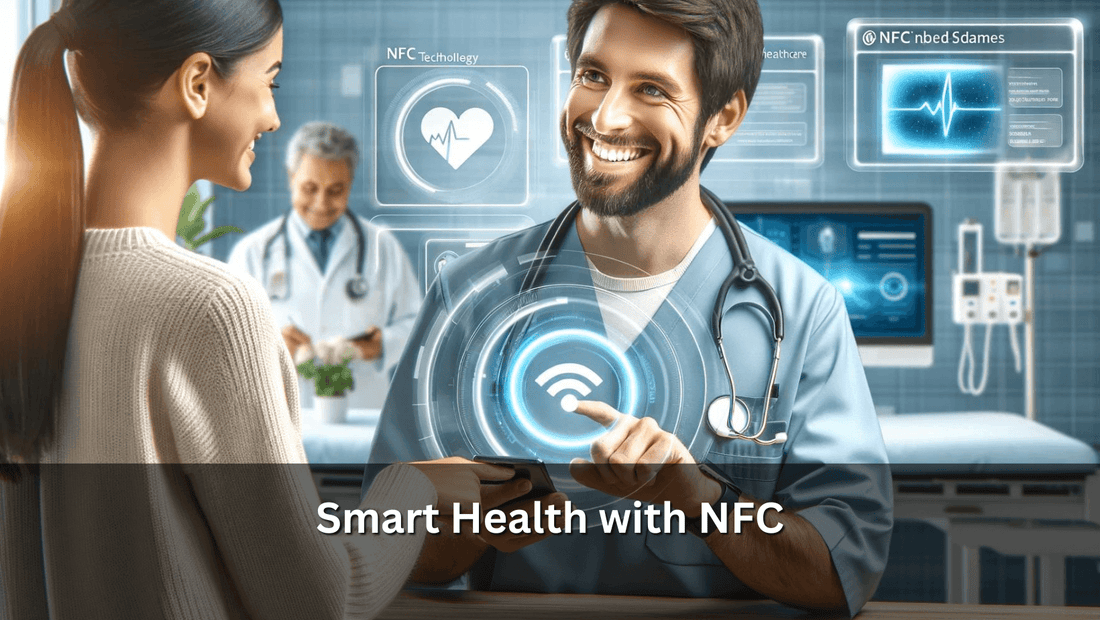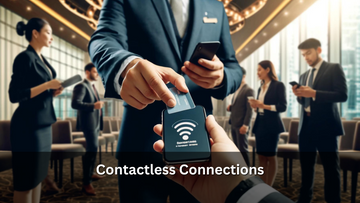Smart Health with NFC

Introduction to NFC in Healthcare
Near Field Communication (NFC) technology is revolutionizing the healthcare sector by enhancing the way patient data is managed and accessed. NFC is a short-range wireless communication technology that allows the exchange of data between devices within a few centimeters. This technology is widely recognized for its applications in contactless payments and access control, but its potential in healthcare is vast. NFC can securely store and transmit patient information, facilitate real-time monitoring, and improve the overall efficiency of healthcare services. The integration of NFC in healthcare ensures privacy, convenience, and improved patient outcomes (Mindster)
Benefits of NFC for Patient Data Management
NFC technology offers numerous benefits for managing patient data in healthcare settings. One of the primary advantages is the secure and efficient storage and retrieval of patient information. NFC-enabled devices, such as wristbands or cards, can store critical health data, making it easily accessible to healthcare providers with a simple tap. This capability reduces the risk of errors associated with manual data entry and ensures that medical professionals have up-to-date information at their fingertips.
Additionally, NFC enhances patient safety by providing real-time updates on patient status and treatments. For instance, NFC tags can be used to track medication administration, ensuring that patients receive the correct dosage at the right time. This reduces the likelihood of medication errors and improves overall patient care (NXP® Semiconductors Official Site) (Issuu).
NFC also facilitates seamless communication between different healthcare systems and devices, promoting interoperability and improving the coordination of care. By streamlining data management processes, NFC helps healthcare providers deliver more personalized and timely care to patients (STMicroelectronics).

Enhancing Security with NFC in Healthcare
NFC technology significantly enhances security in healthcare by providing robust measures to protect sensitive patient information. One of the key security benefits of NFC is its ability to encrypt data during transmission, ensuring that patient records and other critical information are protected from unauthorized access. This encryption is vital for maintaining patient privacy and complying with regulations such as HIPAA.
Moreover, NFC enables secure access control within healthcare facilities. NFC-enabled badges and devices can restrict access to sensitive areas, such as medication storage rooms and patient records, to authorized personnel only. This reduces the risk of internal breaches and ensures that only qualified staff can access critical areas and information.
Another crucial aspect is the prevention of data tampering. NFC devices can verify the authenticity of medical records and prescriptions, ensuring that the data has not been altered. This is particularly important for safeguarding against fraudulent activities and maintaining the integrity of patient data.
By integrating NFC technology, healthcare organizations can create a more secure environment for both patients and healthcare providers, ensuring that sensitive information is protected at all times.
Real-Time Patient Monitoring Using NFC
NFC technology plays a crucial role in real-time patient monitoring, offering significant advantages in tracking and managing patient health. NFC-enabled devices, such as wristbands and patches, can continuously monitor vital signs like heart rate, temperature, and blood pressure. This data is instantly transmitted to healthcare providers, allowing them to make timely and informed decisions about patient care.
The real-time aspect of NFC monitoring ensures that any critical changes in a patient's condition are detected immediately, enabling rapid response and intervention. This is particularly beneficial for patients with chronic conditions or those recovering from surgery, as it reduces the need for constant physical check-ups while still providing continuous oversight.
Furthermore, NFC technology simplifies the logging of patient activities and treatments. Healthcare professionals can update patient records on the go by simply tapping their NFC-enabled devices, ensuring that the data is accurate and up-to-date. This not only improves the efficiency of healthcare delivery but also enhances the quality of care by providing a comprehensive view of the patient's health status.
NFC for Efficient Medication Management
NFC technology is revolutionizing medication management in healthcare by ensuring accuracy and efficiency. One of the primary applications is the use of NFC tags on medication packaging. These tags can store detailed information about the medication, including dosage instructions, expiration dates, and potential side effects. By simply tapping their smartphone or NFC reader on the tag, healthcare providers and patients can instantly access this crucial information, reducing the risk of medication errors.
Moreover, NFC technology helps in tracking medication adherence. NFC-enabled pill dispensers and smart bottles can record when a medication is taken and send reminders if a dose is missed. This data can be transmitted to healthcare providers, allowing them to monitor patient compliance and make necessary adjustments to treatment plans.
NFC also facilitates the secure authentication of medications, preventing the use of counterfeit drugs. When a medication package is scanned, the NFC tag can verify its authenticity and provide a digital record of its distribution history. This enhances the safety of the medication supply chain and ensures that patients receive genuine products.
By integrating NFC technology into medication management, healthcare providers can improve the accuracy of treatments, enhance patient adherence, and ensure the safety and efficacy of medications.
NFC in Home Healthcare
NFC technology is revolutionizing home healthcare by enabling real-time health monitoring and seamless communication between patients and healthcare providers. NFC-enabled devices, such as wristbands or patches, can track vital signs like heart rate and blood pressure. Patients can easily transmit this data to their healthcare providers by tapping the NFC device to a smartphone or tablet. This technology allows for timely interventions, reduces the need for frequent hospital visits, and enhances patient convenience. For chronic conditions, NFC provides a reliable way to manage health remotely, improving overall care and patient outcomes.
Custom NFC Health Cards for Personalized Care
Customized NFC health cards are transforming patient care by offering personalized solutions that cater to individual needs. These cards, which can be printed with the healthcare provider's logo and the patient's name, also include a QR code that links to the patient's medical status and condition. This innovative approach ensures that crucial medical information is always accessible, facilitating swift and accurate treatment in emergencies.
The NFC-enabled cards can be encoded with the same medical data, providing a dual-layer of accessibility. This not only enhances patient safety but also streamlines the workflow for healthcare professionals, reducing the time spent on retrieving patient records. By integrating these customized cards into healthcare systems, providers can ensure that they deliver timely and effective care.
For more information on customized NFC cards, visit our product page: Customized Colored PVC Digital Cards.


Future of NFC in Healthcare
The future of NFC technology in healthcare is promising, with numerous advancements on the horizon. As the technology continues to evolve, we can expect more sophisticated applications that further enhance patient care and operational efficiency. For instance, the integration of NFC with other emerging technologies like IoT and AI will enable more precise and personalized healthcare solutions. Smart hospitals equipped with NFC can automate various processes, from patient check-ins to real-time monitoring of medical equipment.
Additionally, advancements in NFC technology will likely lead to even greater security measures, ensuring that patient data remains protected against evolving cyber threats. The continuous development of NFC standards and protocols will also facilitate greater interoperability among healthcare systems worldwide, promoting seamless data sharing and collaboration across different healthcare providers.
Overall, the future of NFC in healthcare is set to transform the industry by making it more efficient, secure, and patient-centric.
Conclusion
NFC technology is transforming healthcare by enhancing data security, improving patient monitoring, and enabling efficient home care. Its integration offers significant benefits for both patients and healthcare providers, paving the way for a more connected and efficient healthcare system.
We at NFC Tagify provide all sort of NFC Solutions or you may contact us: Tel. 01600800080, Email: info@nfctagify.com









